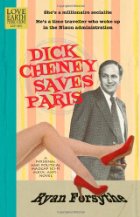 What to get for the folks on your holiday list? Books of course! I always believe that your favorite book of the year makes a great gift for everyone. Here are some recommends from my family to yours:
What to get for the folks on your holiday list? Books of course! I always believe that your favorite book of the year makes a great gift for everyone. Here are some recommends from my family to yours:
Grayson loved City of Ember. He read it for the second time this year and especially loved the movie it inspired. This one has a strong female lead, perfect for the YA reader on your list.
Tessa, for some reason, calls all books Ga-Ga books. She says, "read me this ga ga book or read me ga ga (insert name of book)." Her favorites have been one based on an Edward Lear poem The Owl and the Pussycat and also a very frothy, syrupy, sweetie book called Pinkalicious. Both available on-line or at your favorite bookstore.
My husband Geoff reads only e-books now so I have no idea what he has been reading, but I took some time to ask him what he recommends from this past year. He suggested Routes of Man: How Roads are Changing the World and the Way we Live. Geoff says, it puts roads in their proper context and is a harrowing travel memoir.
He also recommends Triumph of the City: How Our Greatest Invention Makes us Richer, Smarter, Greener, Healthier, Happier. This books focuses on the creativity and the people that come together to make a city. Urban Policy that focuses solely on infrastructure and not the humans that live there wind up as cities with empty buildings.
As for me I have recently dug out a copy of Staying Put: Making Home in a Restless World by Scott Russell Sanders and am writing and thinking about the value of home. I hope you and yours also are enjoying home and the simple pleasures of the season: music, lights, good food, laughter, and warm company.
I take a few weeks off from my blog at holiday time. I'll be back in the New Year with plenty of good book recommendations. Happy Holidays to all!
What are your best reads of the past year? Please recommend them below.
Tessa, for some reason, calls all books Ga-Ga books. She says, "read me this ga ga book or read me ga ga (insert name of book)." Her favorites have been one based on an Edward Lear poem The Owl and the Pussycat and also a very frothy, syrupy, sweetie book called Pinkalicious. Both available on-line or at your favorite bookstore.
 |
| She likes the part about plenty of money |
 |
| Tries to eat the cupcakes off the page |
He also recommends Triumph of the City: How Our Greatest Invention Makes us Richer, Smarter, Greener, Healthier, Happier. This books focuses on the creativity and the people that come together to make a city. Urban Policy that focuses solely on infrastructure and not the humans that live there wind up as cities with empty buildings.
As for me I have recently dug out a copy of Staying Put: Making Home in a Restless World by Scott Russell Sanders and am writing and thinking about the value of home. I hope you and yours also are enjoying home and the simple pleasures of the season: music, lights, good food, laughter, and warm company.
I take a few weeks off from my blog at holiday time. I'll be back in the New Year with plenty of good book recommendations. Happy Holidays to all!
What are your best reads of the past year? Please recommend them below.




































